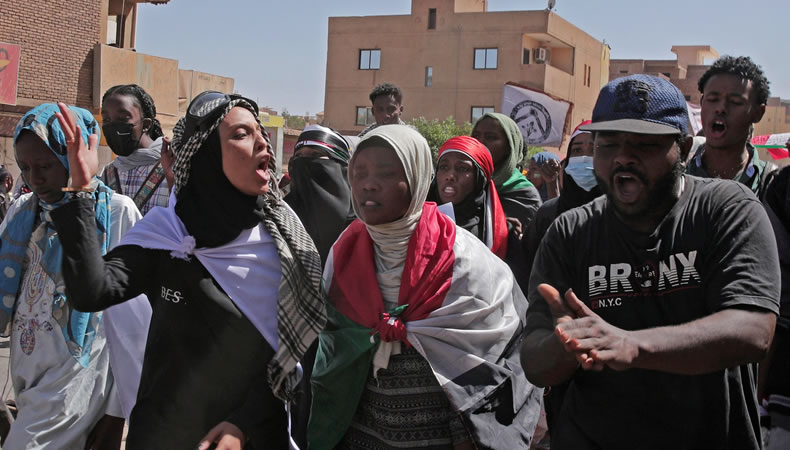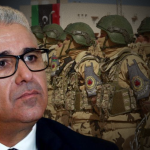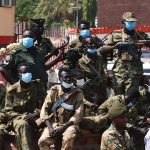Sudan: Military rulers intensify crackdown and detain activists


The guys, several of whom were dressed in plainclothes and armed with Kalashnikov rifles, pistols, and batons, pounded on the bathroom door, ignoring her mother’s pleas to let her get dressed first. “It was like they were in a combat or following a deadly terrorist, not a crippled woman,” Amani Osman, a human rights lawyer, said.
Osman, who has been using crutches since a 2017 injury, was twice imprisoned by Sudan’s previous dictatorial President Omar al-Bashir for breaking stringent Islamic norms restricting women’s behavior and attire. The detentions have increased in recent weeks as Sudan has been thrown deeper into chaos by near-daily public protests, raising worries of a full-fledged return to al-authoritarian Bashir’s policies. Sudan’s transition to democratic governance was thrown off by the coup, which came after three decades of international isolation under al-Bashir, who was ousted from office in 2019 following a popular revolt.
“The military sends a message to international diplomats that they are interested in a political dialogue and fundamental reform of the state, but they do nothing to hide their overt efforts to maintain the status quo and undermine efforts to depose them,” said Cameron Hudson, a former State Department official and Sudan expert at the Atlantic Council’s Africa Center.
Related Posts
Security forces started a brutal assault on protestors after the coup. They used live bullets and tear gas on crowds in the streets, as well as knocking down the country’s internet and cellphone service, all in an attempt to prevent people from assembling. According to a Sudanese medical association, some 80 individuals, largely young men, have been murdered and over 2,200 others injured in the demonstrations.
Sudanese security personnel have also been accused of committing sexual assault against women who have participated in the protests. The governing, military-led Sovereign Council said on Dec. 19 that an inquiry into charges of rape and gang rape had been initiated after the United Nations demanded one. This isn’t the first occasion that security personnel have been accused of rape. The United States, the United Kingdom, and Norway, as well as the European Union, Canada, and Switzerland, have termed the current pattern “troubling,” and have asked for the release of “all individuals who have been wrongfully held.”
“We remind Sudan’s military authorities of their responsibility to protect human rights and secure the safety of individuals detained or imprisoned, as well as the importance of ensuring that due process is followed consistently in all cases,” the organization said in a statement issued by the US State Department. The imprisonment of Osman garnered widespread attention and concern. On Sunday, she was finally released. Her family, on the other hand, had no idea where she was being detained for over a week following her detention. According to the report, they then received a phone call requesting them to send garments to a jail in Khartoum’s twin city, Omdurman.
Osman claimed she was held in solitary confinement for the first three days in “extremely poor and humiliating conditions.” Then Eman Mirghani, another activist, joined her in the cell. Mirghani is still being held in custody. Authorities accused Osman of having illegal firearms and ammunition in her possession, claiming that the “five old bullets” discovered in her clothing were mementos from a 2016 national shooting competition in which she competed. Officers raided Osman’s home, but it’s unknown who they are. They claimed to be from a drug-fighting unit during the raid, but Amani Osman, the sister-lawyer, believes they were from the country’s dreaded General Intelligence Service.
Previously called as the National Intelligence and Security Service, the organization was employed by al-administration Bashir’s to suppress opposition for decades. The military restored the agency’s powers after the coup, including the ability to hold detainees without alerting their relatives. Many of their inmates are said to be held in underground prisons known as “Ghost Houses.” The actual number of persons held across the country, according to Gibreel Hassabu, a lawyer with the Darfur Bar Association, a human rights advocacy group, is still unclear — a situation reminiscent of al-tenure. Bashir’s Hassabu claims to be aware of more than 200 activists and protest leaders jailed in Sudan’s capital. According to documentation, several activists were kidnapped from their homes or grabbed from the streets.
According to the records, at least 46 activists are detained at Khartoum’s Souba Prison. Some female activists, notably Amira Osman, are detained at Omdurman’s women’s jail. Following the shooting of a senior police officer during a protest outside the presidential palace in Khartoum on Jan. 13, the wave of arrests has grown. According to local reports, the cop was stabbed to death. Security officers entered a hospital in Khartoum and detained six people, including an injured protester and women who were visiting him, accusing them of being involved in the murder.
On Jan. 29, paramilitary members from the Rapid Support Forces, a security force with a reputation for violence, kidnapped Mohamed Abdel-Rahman Naqdalla, a physician and activist, off a Khartoum street, according to his family. The RSF’s representative did not respond to calls for comment. The squad, which is mostly made up of former militias, has been linked to crimes committed in Darfur’s western area under al-Bashir. It is led by Mohammed Hamdan Dagalo, Sudan’s second most powerful general, and operates its own prison cells in Khartoum and elsewhere in the nation.
Authorities detained Khalid Omar, a minister in the deposed transitional government, again this week. Omar was imprisoned during the coup on October 25 and freed a month later as part of a settlement between military and civilian officials. His opposition Sudanese Congress Party says he was escorted to the party’s headquarters on Wednesday.
Wagdi Saleh, a member of a government-run organization entrusted with erasing al-legacy, Bashir’s regime’s was also detained on Wednesday, according to the pro-democracy Forces of Freedom and Change coalition. Diplomats attempting to reach an accord between military and civilian authorities have been dismayed by the tendency. “Arbitrary arrests and detentions of political actors, civil society activists, and journalists jeopardize attempts to settle Sudan’s political crisis,” said Lucy Tamlyn, the United States’ Charge d’Affaires in Sudan.















